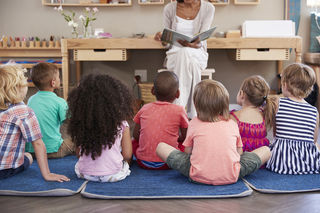Gender
Drag Queen Storytime for Children
Is listening to a drag queen read a story dangerous for a child?
Posted January 23, 2019 Reviewed by Ekua Hagan

Over the last few years in cities ranging from Lafayette, Louisiana, to Taunton, England, libraries have hosted men dressed in outrageous women’s costumes—glitter, feather boas and colorful dresses—who read stories to children, most of whom are preschoolers.
Despite librarians nearly universally attesting to how popular Drag Queen Storytime has become with parents and others in their communities—they report long waiting lists for the events—as news began to hit the Internet and other media, a vocal minority has expressed outrage.
“This is not suitable for young children, especially when they are reading them stories which tell them they may have been born in the wrong body, an impossibility,” said one typical online commenter.
They rant that public libraries want to brainwash preschoolers, one assumes, into becoming gay. Conservative groups, such as the Family Policy Alliance, have organized automated protest letters against the events, and some groups have filed lawsuits, though so far these have been unsuccessful.
One of the popular reads is A Day in the Life of Marlon Bundo, by Jill Twiss, a comedy writer for Last Week with John Oliver, which is a parody of a children’s book about a rabbit written by Mike Pence’s daughter. In the Twiss version, two male bunnies want to get married and Vice President Mike Pence is the villain—a stink bug who tries to stop them.
The outrage and fear these opposers demonstrate is unfounded and based largely on hatred of nonconformity (and perhaps unacknowledged fears about their own sexuality). They are concerned that such events will confuse the children and even cause them to worry that they are the wrong gender.
We live in a society that only recognizes that children are cisgender, the belief that your gender identity must match with the gender you were assigned at birth. As a longtime sex and gender therapist, I know that there is no substance to the argument that exposing anyone, including children, to the reality of people with a different sexual orientation or gender identity influences the children’s innate sexual orientation or gender identity. Nonetheless, there is much fear about a gay parent “impacting” their offspring, or how the behavior of LGBTQ adults will influence them.
Ironically, when people think about children, rarely is their focus on how homophobia, biphobia, and transphobia can hurt them, and yet exposure to these institutional harms are far worse than anything a child might be exposed to in an LGBT Pride parade, observing gay and lesbian relationships, or being read a story by a drag queen.
The real problem, as I see it, lies not in exposing children to the reality of diverse sexualities and gender identities—those who do not fit the typical definitions of masculinity or femininity—but rather not providing gender-nonconforming kids with other templates as they begin to sort out their feelings about who they authentically are.
Data shows a far higher rate of suicide, 41 percent, for transgender children than others. When they are made to feel like outsiders, bullied in school, and rejected by the society in which they live, they move into crisis.
The worst outcome of watching a drag queen tell a story is not influencing a child to worry and wonder if they are the “wrong gender,” as many want us to believe. The outcome that can occur watching a drag queen telling a story is that it can save the lives of those children who are struggling with gender nonconformity and free them to explore and express themselves in ways they were meant to be and not supposed to be.
Outrage over these Drag Queen Storytime sessions reveals other dark underbellies of our society—misogyny and homophobia. Think about it: If women dressed as men were reading the stories, there might be no problem. But men dressed as women? Such an assault on the nation’s ideal of masculinity is intolerable to many.
Misogynist conditioning compromises people’s integrity by pressuring them to treat others badly—actions contrary to their basic humanity. Misogyny and homophobia combined with fear and revulsion of sex eliminates discussions about the lives and sexuality of LGBT people as part of school-based sex education, keeping vital information from all students.
As the studies confirm, it can be deadly. It inhibits their ability to form close, intimate relationships with members of their own sex, generally restricts communication with a significant portion of the population and, more specifically, limits family relationships.
Costumes are playthings, flights of imagination that allow us to step out of the mundanity of our daily lives and into fantasy. They don’t entice us to become the characters in costume. Every day thousands of children are delighted to visit Disneyland and meet characters dressed up as animals—Mickey or Goofy or Donald Duck. Do they leave wanting to become animals? Are they confused or just delighted at the unusual display?
In many cases, the stories being read introduce kids to the idea that all others, despite appearance or sexual orientation, are worthy of respect, and to a world that is not divided into “us” and “others.” Drag Queen Storytime provides an opportunity for parents to begin to have conversations with their kids about respecting other types of people and reassuring them that they will love their child however he or she chooses to express themselves.
As one library patron in Lafayette said, “We need to learn how to recognize each other, how to see each other’s gifts and talents and flaws, and how to meet each other. The storytime that’s caused so much controversy is just an opportunity for kids—older kids, younger kids, almost babies—to see each other, to experience something they’ve never seen before, and learn how to relate to it.”
I applaud the librarians who, for the most part, have stuck to their guns and refused to allow these popular programs to be shut down by those stuck in the past when there was only one view of what human beings are supposed to be.




